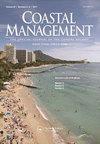设计和举办网络研讨会,以改善环境研究人员和自然资源从业者之间的科学交流和参与
IF 1.9
4区 环境科学与生态学
Q4 ENVIRONMENTAL SCIENCES
引用次数: 1
摘要
自然资源管理学科的研究发现,研究人员和管理者之间存在实施差距,制度规范和实践限制了将新数据和观察结果整合到决策中。这一差距在很大程度上已经通过出版物和会议报告等单向科学传播工具得到了解决。虽然这些工具可以有效地设计和提供,但越来越多的证据表明,双向沟通可以建立更多的信任,增强参与,并可能导致在决策中更积极地使用科学信息。美国国家海洋和大气管理局(NOAA)西部区域合作小组的西部观察网络研讨会是一个单向的交流工具,它向NOAA专家和主要合作伙伴的内部听众分享有关气候、天气和海洋状况异常的信息。美国国家海洋和大气管理局有兴趣扩展这一工具,以改善其服务的社区对信息的获取和使用。本研究采用混合方法来评估西方观察如何转变为双向交流工具,促进研究演讲者和听众之间的双边信息流动。在文献的支持下,研究结果为西方观察的五种最佳实践和变革建议,以及未来科学传播工具的设计和实施提供了信息。本文章由计算机程序翻译,如有差异,请以英文原文为准。
Designing and Delivering Webinars to Improve Science Communication and Engagement between Environmental Researchers and Natural Resource Practitioners
Abstract Research across natural resource management disciplines has identified an implementation gap between researchers and managers, where institutional norms and practices limit integration of novel data and observations into decision-making. This gap has largely been addressed using one-way science communication tools such as publications and conference presentations. While these tools can be designed and delivered effectively, mounting evidence suggests two-way communication builds more trust, enhances engagement, and may lead to more active use of scientific information in decision-making. The National Oceanic and Atmospheric Administration (NOAA) Western Regional Collaboration Team’s West Watch webinar is a one-way communication tool that shares information about climate, weather, and ocean condition anomalies to an internal audience of NOAA experts and key partners. NOAA is interested in expanding this tool to improve information accessibility and use by communities of interest that NOAA serves. This research uses a mixed-methods approach to evaluate how West Watch could change to function as a two-way communication tool, facilitating bilateral information movement between research presenters and the audience. Research results, supported by literature, inform five best practices and recommendations for changes to West Watch, as well as the design and implementation of future science communication tools.
求助全文
通过发布文献求助,成功后即可免费获取论文全文。
去求助
来源期刊

Coastal Management
环境科学-环境科学
CiteScore
6.00
自引率
0.00%
发文量
24
审稿时长
>36 weeks
期刊介绍:
Coastal Management is an international peer-reviewed, applied research journal dedicated to exploring the technical, applied ecological, legal, political, social, and policy issues relating to the use of coastal and ocean resources and environments on a global scale. The journal presents timely information on management tools and techniques as well as recent findings from research and analysis that bear directly on management and policy. Findings must be grounded in the current peer reviewed literature and relevant studies. Articles must contain a clear and relevant management component. Preference is given to studies of interest to an international readership, but case studies are accepted if conclusions are derived from acceptable evaluative methods, reference to comparable cases, and related to peer reviewed studies.
 求助内容:
求助内容: 应助结果提醒方式:
应助结果提醒方式:


